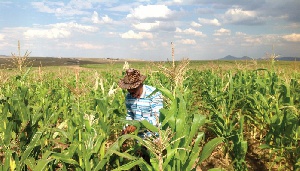The Kumasi Institute of Tropical Agriculture (KITA) as part of the effort to assist roll back the nation’s high post-harvest losses, is building a GH?160,000.00 agro-processing facility at Domeabra in the Ejisu-Juaben Municipality.
The Australian Government is funding the project under its direct aid programme and it is expected to be ready by June.
It would significantly help to add value to cassava, palm nuts and moringa, which is produced in large volumes in the municipality.
Mr. Andrew Barnes, the Australian High Commissioner to Accra, who was on hand to perform the ceremony for the start of construction works on the project, underlined the government’s determination to sustain its collaboration and support for Ghana to grow its agriculture.
“Ghana has high agricultural potentials and as a development partner, my country is ready to providing it with the needed aid to address challenges inhibiting the sector’s growth to improve the economy”, he added.
The Food and Agriculture Organization (FAO) estimates that about US$4 billion is lost to sub-Saharan Africa annually through post-harvest grain losses.
This could meet the minimum annual food requirement of at least 48 million people and that is why more should be done to substantially reduce the losses.
Mr. Barnes said the expectation was that the facility would help expose students of KITA to agro-processing technology.
The High Commissioner hailed the Institute for helping people to grow and eat organic foods and gave the assurance that his government would continue to work with it in its training programmes.
Mr. Samuel Owusu-Takyi, Director of the Institute, announced of plans to establish a ‘Green Market’, which would solely deal in the sale of organic food products.
The aim, he said, was to reduce to the barest minimum the high in-take of inorganic foods, which come with their own health problems.
KITA each year trains in excess of 350 young people to acquire knowledge and skills in various agricultural areas - agro-forestry and agri-business, farm management, post-harvest technology, animal science and value chain development.
Regional News of Tuesday, 24 January 2017
Source: GNA













